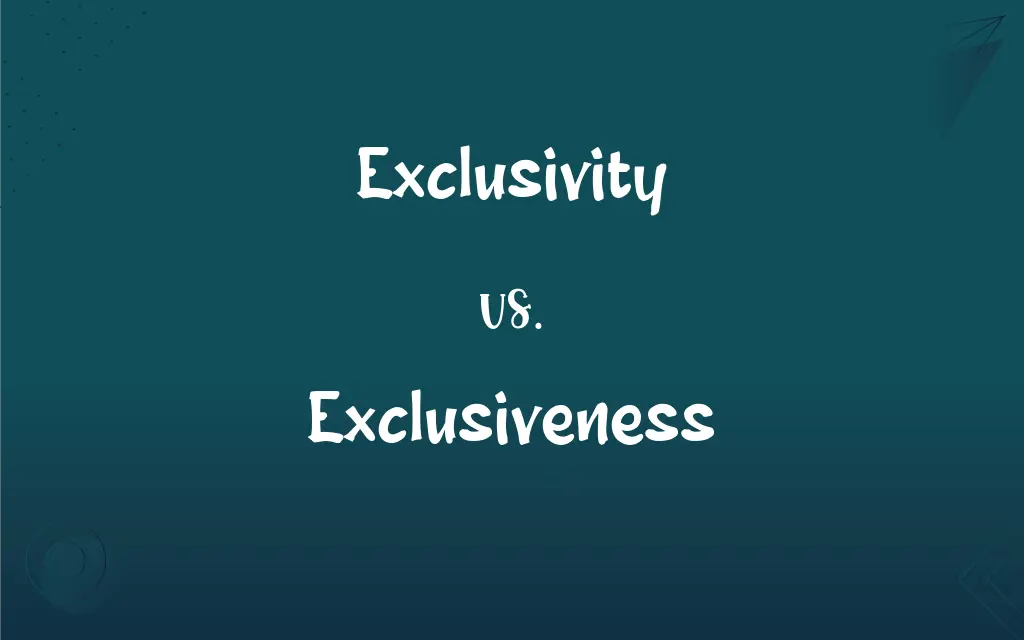Exclusivity vs. Exclusiveness: What's the Difference?
Edited by Aimie Carlson || By Janet White || Published on January 12, 2024
Exclusivity refers to the state of being exclusive, often implying a formal or contractual limitation. Exclusiveness denotes the quality or state of being exclusive, emphasizing the character or nature of something.

Key Differences
Exclusivity often carries a sense of contractual or formal arrangements, like exclusive rights or partnerships. Exclusiveness, on the other hand, refers to the nature of being selective or elite, like a club’s exclusiveness.
The term exclusivity is frequently used in business and legal contexts, indicating a unique privilege or access. In contrast, exclusiveness is more about the quality or atmosphere of being elite or restricted in access.
Exclusivity can imply a limited time or scope under certain conditions, like an exclusive contract. Conversely, exclusiveness often relates to the inherent nature of something, such as the exclusiveness of a high-end brand.
In terms of relationships or agreements, exclusivity suggests a formal agreement to limit access or participation to certain parties. Exclusiveness, meanwhile, might describe the general aura or character of an entity, emphasizing its selective nature.
Exclusivity can be seen as a legal or formal status, while exclusiveness is more about the perception or character, portraying a sense of selectivity or elitism.
ADVERTISEMENT
Comparison Chart
Context
Formal arrangements, contracts
Quality or state of being exclusive
Usage
Business, legal terms
Describing selectivity, elite nature
Implication
Limited access based on agreements
Inherent selectivity or elitism
Nature
Contractual, time-bound
Characteristic, inherent quality
Focus
Specific rights or privileges
Atmosphere or aura of selectivity
ADVERTISEMENT
Exclusivity and Exclusiveness Definitions
Exclusivity
State of being exclusive to a single entity.
The artist signed an exclusivity deal with the gallery.
Exclusiveness
Quality of being selective or elite.
The exclusiveness of the club made it a status symbol.
Exclusivity
A binding agreement to restrict availability.
The exclusivity clause in the contract was stringent.
Exclusiveness
Characterized by restricted access or high standards.
The exclusiveness of the neighborhood is well-known.
Exclusivity
Sole right to sell or distribute.
They hold exclusivity on the patented product.
Exclusiveness
Being unique or rare in nature.
The exclusiveness of the design adds to its appeal.
Exclusivity
Reserved for a specific group or purpose.
The event's exclusivity made it highly sought-after.
Exclusiveness
Atmosphere of being elite and exclusive.
The restaurant’s exclusiveness added to its allure.
Exclusivity
Unique access or rights granted formally.
The company's exclusivity period for the software ends this year.
Exclusiveness
Associated with a select, privileged group.
The exclusiveness of the event appealed to the elite.
Exclusivity
Excluding or tending to exclude
Exclusive barriers.
Exclusiveness
Excluding or tending to exclude
Exclusive barriers.
FAQs
Does exclusivity imply uniqueness?
Yes, exclusivity implies a unique status or access.
Is exclusivity a legal term?
Yes, exclusivity is often used in legal or contractual contexts.
Can exclusivity be temporary?
Yes, exclusivity can be limited to a specific time frame.
What does exclusiveness mean?
Exclusiveness refers to the quality of being elite, selective, or restricted.
Is exclusiveness always intentional?
Exclusiveness can be both intentional and a natural result of certain conditions.
Can exclusiveness be based on personal qualities?
Yes, exclusiveness can be based on personal qualities or achievements.
Is exclusivity a common term in marketing?
Yes, exclusivity is commonly used in marketing to denote unique offerings.
What does exclusivity mean?
Exclusivity refers to a state or condition where access or rights are restricted to certain entities.
Is exclusivity applicable in business deals?
Yes, exclusivity is common in business deals and agreements.
Can a product be marketed as exclusive?
Yes, products are often marketed as exclusive to attract a certain clientele.
Can exclusiveness relate to social status?
Yes, exclusiveness often relates to elite status or high social standing.
Does exclusiveness imply superiority?
Exclusiveness often carries an implication of superiority or high quality.
Is exclusivity always positive?
Exclusivity can be seen as positive or negative, depending on context and perspective.
Can a place or event be described as exclusive?
Yes, places or events can be described as exclusive, indicating restricted access or high status.
Does exclusivity mean only one party has access?
Yes, exclusivity often means that only one party has access or rights.
Does exclusiveness always require high standards?
Often, exclusiveness is associated with high standards or criteria.
Does exclusiveness appeal to a niche market?
Exclusiveness often appeals to niche markets or specific demographics.
Are exclusivity and exclusiveness interchangeable?
While related, they are not interchangeable; exclusivity is more about rights or access, whereas exclusiveness is about the quality or nature of being exclusive.
Can exclusiveness be a marketing strategy?
Yes, exclusiveness can be used as a strategy to enhance appeal or status.
Is exclusivity legally binding?
Exclusivity can be legally binding when outlined in contracts or agreements.
About Author
Written by
Janet WhiteJanet White has been an esteemed writer and blogger for Difference Wiki. Holding a Master's degree in Science and Medical Journalism from the prestigious Boston University, she has consistently demonstrated her expertise and passion for her field. When she's not immersed in her work, Janet relishes her time exercising, delving into a good book, and cherishing moments with friends and family.
Edited by
Aimie CarlsonAimie Carlson, holding a master's degree in English literature, is a fervent English language enthusiast. She lends her writing talents to Difference Wiki, a prominent website that specializes in comparisons, offering readers insightful analyses that both captivate and inform.






































































